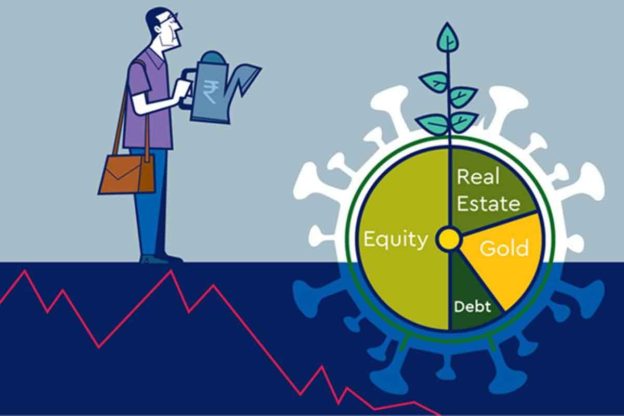Investing in equity without doing asset allocation or/and not keeping a separate debt portfolio is like driving at high speed without brakes.
The stock market wrapped up an unpredictable and volatile 2020 with a spectacular recovery. Sectors including IT and healthcare/pharma outperformed others in 2020 in the wake of the pandemic, while many others underperformed. Yet again, in 2021, when the second wave of pandemic has hit all of us hard, investors are exploring safe investment options. Perhaps top performers of 2020 could still retain the baton for 2021. The outbreak could have a long-lasting impact on sectors like hospitality, commercial real estate, banking, automobiles and energy.
The sectors of the Indian economy that seem to be most at risk are hospitality sector (hotels, restaurants etc.) and transportation. As the second wave intensifies, there will be buying interest in the safer sectors such as FMCG, healthcare and IT. Therefore, it is advisable for investors to choose sectors with good growth potential, good market share and consistent profitability.
Let’s explore the likely behaviour of some of the most popular sectors for investment:
1. Healthcare Sector
The pharmaceuticals sector was one of the top performers in the stock market in 2020, acting as a saviour for investors with substantial returns. There are high hopes that the sector will continue to remain in focus in 2021 as there is an ever increasing demand for life saving drugs, immunity boosting supplements and people focus more than ever on buying healthcare products. Further, with vaccination drive in full swing, there is a sizeable opportunity for the listed pharmaceutical companies as India looks forward to welcoming many other variants of vaccine. In a nutshell, the healthcare sector as a whole will continue to grow at least till we do not see a drastic decrease in the number of Covid-19 cases and hence, the investors can back the sector without a doubt.
2. Telecom Sector
Telecom has been one of the most important services and sectors during the global pandemic. It has been a key enabler in helping government and healthcare authorities in timely communication, tracking the developments and also, implementing work from home and keeping the economy going. As demand for bandwidth is expected to go up from existing customers, telecom will likely remain among well-performing sectors.
3. FMCG Sector
The nationwide lockdown and supply chain challenges created panic among consumers in 2020, especially concerning essential commodities. As the second wave doesn’t seem to subside anytime soon, consumers might begin over-stocking essential products and consumer staples. The existing uncertainty around the future of the second wave may cause an uptick in spending by consumers on essentials which will boost sales of FMCG companies.
4. Agriculture Sector
The overall impact on the agricultural sector should be very low. As states have cleared that seeds fall under the essentials category, the impact is likely to be low. Further, owing to existing inventories of fertilisers, there is likely to be less impact on the category except for logistics and port clearances in India. Talking about agro chemicals, companies that depend on imports of raw ingredients as well as exports of finished goods, will likely be impacted.
5. Aviation Sector
Aviation was one of the adversely impacted sectors during the first wave of Covid-19 and the situation during the second wave is slowly turning grim as restrictions continue to rise. Hence, the days ahead don’t seem to be good for aviation. The same goes for the hospitality sector as well .
6. Banking Sector
Banking stocks will be under pressure due to reduced offtake of loans under recessionary market conditions and cautious customer outlook will impact profitability of the banks. Also, there will be a decline in banking income due to lower cross border trade.
7. Automobile Sector
Automobiles are one of the discretionary items and vehicles sales will largely depend on consumer sentiments. During the first wave, the sector witnessed a steep decline in sales except for tractors that continued to experience solid growth. Now, amidst the uncertain situation, consumer sentiments remain weak and the demand for non-essential items is likely to fall further. The recovery of the sector depends on how fast India can bring the second wave under control.
Conclusion
In times like these, the investors need to stay invested in good companies – the ones with good balance sheets and those run by market leaders because they are least likely to be unable to survive the storm. Further, investing in equity without doing asset allocation or/and not keeping a separate debt portfolio is like driving at high speed without brakes.
https://www.financialexpress.com/money/investment-tips-top-7-sectors-to-consider-during-the-current-scenario/2257473/







